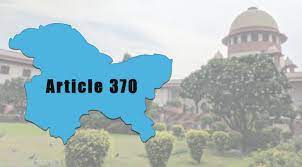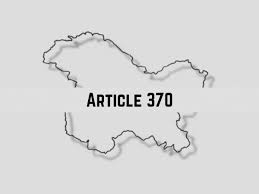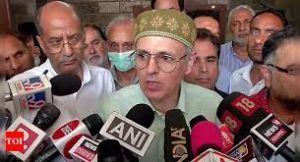
Supreme Court Delivers Landmark Verdict on Article 370: Abrogation Deemed Constitutionally Valid
The Supreme Court upheld the Centre’s decision to abrogate Article 370, which granted special status to Jammu and Kashmir.
The Supreme Court on Monday upheld the Centre’s decision to abrogate Article 370, which granted special status on the erstwhile state of Jammu and Kashmir.
The Supreme Court also directed the Election Commission to hold Jammu and Kashmir assembly elections by September 30, 2024.
Chief Justice of India DY Chandrachud, writing the judgment for himself and Justices Gavai and Surya Kant, said Article 370 of the Constitution was a temporary provision and the president has the power to revoke it.
The Supreme Court ruling can be seen as a big boost for Prime Minister Narendra Modi and the Bharatiya Janata Party ahead of the 2024 Lok Sabha elections. Jammu and Kashmir lost its special status in August 2019 under Article 370 of the Constitution, months after the BJP won elections by a landslide and the prime minister made good on a key election pledge.
The Supreme Court was hearing petitions challenging a series of legislative and executive orders to scrap the special status of the erstwhile state of Jammu and Kashmir and split it into union territories, including Ladakh. Since then, the Jammu and Kashmir administration had restricted the movement of people, curbed internet connectivity and arrested local political leaders.
CJI Chandrachud reading out the judgment said every decision taken by the Centre on behalf of a state under proclamation can’t be subject to a legal challenge and it will lead to the administration of the state to a standstill.
The Supreme Court said it has held that Article 370 was a temporary provision.
” The proclamation of Maharaja stated that the Constitution of India will supersede. With this, the para of Instrument of Accession ceases to exist….Article 370 was an interim arrangement due to war conditions in the State. Textual reading also indicates that Article 370 is a temporary provision,” the court said.
The court also mentioned that the argument of petitioners that the Union government cannot take actions of irreversible consequences in the state during Presidential rule is not acceptable.
“We have held that the state of Jammu and Kashmir did not retain an element of sovereignty when it joined the Union of India. We have arrived at this conclusion for the following reasons. First paragraph eight of the instrument of acession executed by Maharaja Hari Singh provided that nothing in the instrument would affect the continuance of the sovereignty of the Maharaja in and over the state,” CJI Chandrachud said.
The CJI further noted that on November 25, 1949, a proclamation was issued for the State of Jammu and Kashmir by “Yuvraj Karan Singh”.
“The declaration on this proclamation, that the Constitution of India would not only supersede all other constitutional provisions in the state, which were inconsistent with it, but also abrogate them, achieves what could have been attained by an agreement of merger. With the issuance of the proclamation, paragraph of the instrument of acession ceases to be of legal consequence. The proclamation reflects the full and final surrender of sovereignty by Jammu and Kashmir through its sovereign ruler to India ” the CJI added.
The Supreme Court said, “The declaration issued by the President exercises the power and clause 3 of Article 370 is a culmination of the process of integration. Thus, we do not find that the President’s exercise of power under Clause 3 of Article 370 was malafide. We hold the exercise of Presidential Power to be valid.”
The court also noted that Article 370 was meant for the Constitutional integration of Jammu and Kashmir with the Union and it was not for disintegration and the President can declare that Article 370 ceases to exist.
“Concurrence of the State government was not required to apply all provisions of the Constitution using Article 370(1)(d). So, the President of India taking the concurrence of the Union government was not malafide,” the court noted.
On September 5, the top court had reserved its verdict after hearing the arguments for 16 days. The Centre had defended its decision to abrogate Article 370, saying there was no “constitutional fraud” in repealing the provision that accorded special status to the erstwhile state of Jammu and Kashmir.
Attorney General R Venkataramani and Solicitor General Tushar Mehta appeared for Centre.
Senior advocate Kapil Sibal, appearing on behalf of the petitioners, had opened the arguments, saying Article 370 was no longer a “temporary provision” and had assumed permanence post the dissolution of the Constituent Assembly of Jammu and Kashmir.

